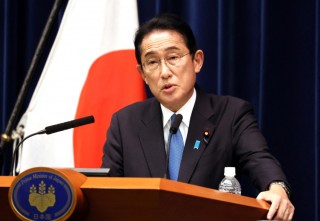Loading
Search
▼ Japan Eyes ¥40-45 Trillion For 5-Year Defense Spending Plan
- Category:Other
Japan is set to earmark 40 trillion to 43 trillion yen for defense spending over five years starting in the next fiscal year, which begins in April, three sources with knowledge of the matter told Reuters on Friday.
That would be a jump from the current five-year defence plan for spending 27.5 trillion yen, stoking worry about worsening one of the industrial world's worst debt burdens, which amounts to twice the size of Japan's annual economic output.
The new numbers marked a compromise between the defense and finance ministries, the three sources said. Until recently, the defense ministry had sought 48 trillion yen, while the finance ministry had multiple options centering around 35 trillion yen.
Prime Minister Fumio Kishida told key ministers on Monday to work on a plan to lift defense spending to an amount equivalent to 2% of gross domestic product within five years, from 1% now, as Tokyo faces an increasingly assertive Beijing.
The key ministers - Finance Minister Shunichi Suzuki and Defense Minister Yasukazu Hamada - are expected to meet again with Kishida this month to iron out differences over the spending plan. The Finance Ministry declined to comment.
Defense authorities had informally floated an idea of spending in the upper range of 40 trillion yen over five years, while finance bureaucrats had sought spending along the lines of the current five-year plan.
"It won't be critical to spend some 40 trillion yen. The question is whether the government could secure funding sources and whether we can let the money flow through domestic defense and related industries to back the economy," said Takuya Hoshino, senior economist at Dai-ichi Life Research Institute.
"If we spend the money to buy weapons and other military goods overseas, that would trigger capital outflows and yen depreciation."
Reflecting opposition from many lawmakers against tax increases, which could nip the nascent economic recovery in the bud, Japan is expected to delay any such moves for at least a year, sources told Reuters.
That would leave the country with fewer options to secure funding for a boost to military spending.
Three government sources, who declined to be identified because of the sensitivity of the issue, said Japan could focus on measures such as spending cuts, more debt issuance, non-tax revenue such as surplus money from the foreign reserves special account, and money left over from funds to help state-related firms cope with COVID.
© Thomson Reuters 2022.
That would be a jump from the current five-year defence plan for spending 27.5 trillion yen, stoking worry about worsening one of the industrial world's worst debt burdens, which amounts to twice the size of Japan's annual economic output.
The new numbers marked a compromise between the defense and finance ministries, the three sources said. Until recently, the defense ministry had sought 48 trillion yen, while the finance ministry had multiple options centering around 35 trillion yen.
Prime Minister Fumio Kishida told key ministers on Monday to work on a plan to lift defense spending to an amount equivalent to 2% of gross domestic product within five years, from 1% now, as Tokyo faces an increasingly assertive Beijing.
The key ministers - Finance Minister Shunichi Suzuki and Defense Minister Yasukazu Hamada - are expected to meet again with Kishida this month to iron out differences over the spending plan. The Finance Ministry declined to comment.
Defense authorities had informally floated an idea of spending in the upper range of 40 trillion yen over five years, while finance bureaucrats had sought spending along the lines of the current five-year plan.
"It won't be critical to spend some 40 trillion yen. The question is whether the government could secure funding sources and whether we can let the money flow through domestic defense and related industries to back the economy," said Takuya Hoshino, senior economist at Dai-ichi Life Research Institute.
"If we spend the money to buy weapons and other military goods overseas, that would trigger capital outflows and yen depreciation."
Reflecting opposition from many lawmakers against tax increases, which could nip the nascent economic recovery in the bud, Japan is expected to delay any such moves for at least a year, sources told Reuters.
That would leave the country with fewer options to secure funding for a boost to military spending.
Three government sources, who declined to be identified because of the sensitivity of the issue, said Japan could focus on measures such as spending cuts, more debt issuance, non-tax revenue such as surplus money from the foreign reserves special account, and money left over from funds to help state-related firms cope with COVID.
© Thomson Reuters 2022.
- December 2, 2022
- Comment (0)
- Trackback(0)


